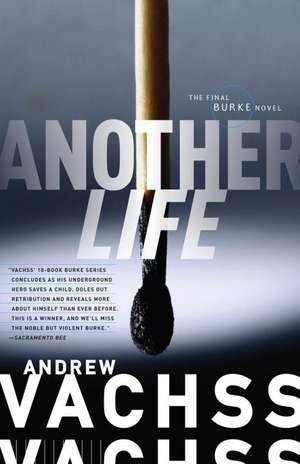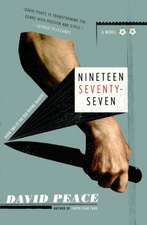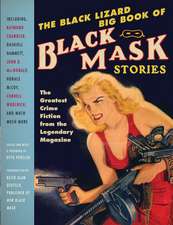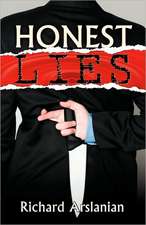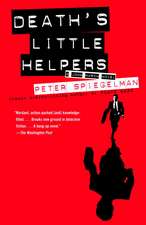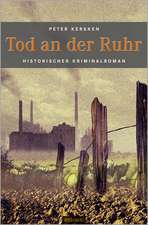Another Life: A Life of Dietrich Bonhoeffer: Burke Series
Autor Vachss, Andrewen Limba Engleză Paperback – 31 aug 2009
Preț: 88.66 lei
Nou
Puncte Express: 133
Preț estimativ în valută:
16.97€ • 17.76$ • 14.12£
16.97€ • 17.76$ • 14.12£
Carte disponibilă
Livrare economică 10-24 martie
Livrare express 21-27 februarie pentru 21.77 lei
Preluare comenzi: 021 569.72.76
Specificații
ISBN-13: 9780307390394
ISBN-10: 030739039X
Pagini: 271
Dimensiuni: 135 x 203 x 22 mm
Greutate: 0.29 kg
Editura: Vintage Books USA
Seria Burke Series
ISBN-10: 030739039X
Pagini: 271
Dimensiuni: 135 x 203 x 22 mm
Greutate: 0.29 kg
Editura: Vintage Books USA
Seria Burke Series
Notă biografică
Andrew Vachss has been a federal investigator in the area of sexually transmitted diseases, a social-services caseworker, a labor organizer, and the director of a maximum-security prison for aggressive-violent youth. Now a lawyer and consultant in private practice, he represents children and youths exclusively. A native New Yorker, Vachss divides his time between the city of his birth and the Pacific Northwest.
The dedicated Web site for Andrew Vachss and his work is www.vachss.com.
From the Hardcover edition.
The dedicated Web site for Andrew Vachss and his work is www.vachss.com.
From the Hardcover edition.
Extras
Revenge is like any other religion: There’s always a lot more preaching than there is practicing. And most of that preaching is about what not to practice.
“Vengeance is mine” translates to: “It’s not yours.” The karma-peddlers will tell you how doing nothing is doing the right thing, reciting, “What goes around comes around,” in that heavy-gravity tone reserved for the kind of ancient wisdom you find in comic books.
Every TV “counselor,” every self-help expert, every latte-slurping guru . . . they all chant some version of the same mantra: “Revenge never solves anything.”
Their favorite psalm is Forgiveness. And their hymn books are always open to the same page.
Get it? When you crawl away, you’re not being a punk; you’re just letting the cosmos handle your business. Whoever hurt you, they’ll get theirs, don’t worry. Just have a little faith.
Down here, we see it different. We don’t count on karma. And you can count on this: hurt one of us, we’re all coming for you.
A low-level maggot once got a little taste of power and overdosed on it. He murdered a thirteen-year-old girl after the three privileged little weasels who had started the fun ran to him for help.
The boys hadn’t meant to kill her; they were good kids who just got a little carried away. All they wanted was to gang-rape the little cock-teaser, take some pictures, and teach her what it cost to humiliate people of their status. But their freakish plan tumbled out of control when the girl suddenly stopped moving.
Terrified, they offered the maggot anything he wanted if he’d dump the body for them.
But when he arrived at the abandoned house where they’d left her, he discovered she wasn’t dead—passed out from the pain, but still breathing, leaking blood. He touched her throat, found a good, strong pulse. If he’d taken her to the ER, she would have survived.
Instead, he went to work on her. His kind of work.
The little girl lived a few more minutes. Alive in terror and praying for death.
More than thirty years later, the maggot and the three grown-up weasels were all killed. They went out within minutes of each other.
We got paid to do that.
Now we’re paying.
The sniper who had calmly pinned my father to the ground as we were making our getaway is gone, too. An on-target warhead from an RPG had turned the stone-shielded corner he’d been firing from into an incinerator big enough for him and the rest of the hired guns up there with him.
So many died that day. Every time my heart pumps, regret pulses through my bloodstream.
That’s the bad thing about killing certain humans: you can only do it once.
“What more can we do, mahn? My father is somewhere between this world and the next. He must stay—his body must stay—with those people until he comes back to us. If he were only in a real hospital . . .”
“We’ve been through this,” I told Clarence. “A thousand times, ever since it happened. You think we can, what, call a city ambulance? The Prof’s prints would fall like a cinderblock on an egg. They’d handcuff him to the bed and turn the whole place into a goddamn PBA convention.”
“I could—”
“You can’t do anything!” I snapped at him, as sharply as his father would have.
“When you were shot—”
“Your father—my father, too, remember?—he made the call then. And he made the right one. This one isn’t the same; the minute we unhook the Prof from those machines, he’s done. This call was on me to make, and I made it. Now we have to play it out.”
“If any of those doctors—”
Max pulled at the sleeve of Clarence’s jacket, the same dove-gray cashmere he’d been wearing the night we dropped the Prof off—now it was almost black, darkened with fear. When Clarence looked up, the mute Mongolian made the universal gesture of pointing his finger like a pistol and dropping his thumb like a hammer. Then tapped his temple, and made a facial expression that spoke louder than words.
“You think those medical boys don’t fucking know that?” I echoed. “They’re not worried about some malpractice claim. They’re running an outlaw operation, and they get paid a fortune to take care of people from our world. That’s what we’re paying so much for: not just the care, the risk—they’re putting a lot more than their licenses on the line, understand? That’s why you never threaten people like them—they’ve heard it all before. It won’t make them work harder. But it might scare them into doing something stupid.”
“But . . . for what they are charging, even with all the money we took from that last . . . thing, we will run out by—”
“I know,” I said soothingly. “But don’t worry about it, Clarence. We found a new way for us to keep earning.”
“Nobody told me—”
“You had no role to play in this one, son,” I said, channeling the Prof. “Not up till now, anyway.”
“Listen to me, sweetheart.” Michelle spoke just above a whisper, her voice the same mystery-blend as her perfume. “Trust me, the word’s out: the Prof’s in the consultant business now. Any serious thief playing for a retirement score would want the Master to check over the plans, make sure there’s no flaw. But they wouldn’t expect a face-to-face. So the Prof’s got a front man for that. Get it?”
“Yes,” the Islander said, looking over at me and nodding. “But how is that going to bring in the kind of money we—?”
“It already is,” I cut him off. “Got more business than we can handle. We’re even ready to have you start working backup, too. If you want.”
Clarence opened his mouth to say something, but Max just shook his head.
Mama crossed the distance from her register at the front to my booth in the back. Looked us all over. Held Clarence with her eyes. Said, “Movie business very good. Those kind of people, spend money like drunks.”
Clarence opened his mouth again, but this time it was Michelle who shut him up. “We’ve got a doctor too, baby. A script doctor. Best in the business. The only one who gets his quote and a percentage of the gross. Let’s you and me go over there and sit down, okay? Buy your baby sister a drink, and I’ll explain it all to you.”
The apartment was spacious by New York standards. Three bedrooms, two baths. And on a decent West Side block, too.
But this was no luxury co-op. No awning over the front door. No doorman, never mind a concierge. No central air. The elevator only went down: all the way down from a uniformed operator, to push-your-own-damn-buttons, to permanent “Out of Service.”
Even the super was part-time. His one qualification was that he’d done time, and his real job was handling complaints with a “you don’t want to go too far with this” look.
Thirty-six units, but only five of them still occupied. The building owner was warehousing the rest, playing stare-down with the remaining owners. No real-estate broker had any of the empty units listed.
Some of the holdouts had been stupid enough to try bribing the super. He introduced them to a new dance: the Sucker Two-Step. Step one, he takes your money. Step two comes when you run into him again—a blank look, like he’s never seen you before.
When it comes to bribery, citizens are out of their league. Even in this everything-for-sale pesthole of a city, you can’t run to the cops when the guy you greased doesn’t do what you paid him for—that would be like a loan shark suing you for missing a payment.
We paid the super for access to the apartment. Not a bribe: payment for a service. He didn’t try his look on us—it’s our kind he learned it from. He wasn’t a genius, but he was smart enough not to confuse us with citizens.
The cell phone in the right-hand pocket of my jacket vibrated. My clients were on their way up . . . up the stairs. I nodded to Max. He opened the door just as they were about to push the disconnected buzzer.
The doctor was in.
There were three of them. Nice business suits, nothing too flashy. I knew the headman by rep only. He may have looked like a pita pocket overstuffed with suet, but if crime was a dance, he had the moves of a tango star.
The other two could have been his partners. Or crew members, or undercover cops. The way we had it set up, it didn’t make any difference. Any tape they walked away with would be about as useful as a Vietnam body count.
My worktable was a rough-hewn slab of wood with fold-up legs. I gestured for them to sit wherever they wanted. Canvas director’s chairs were the only option.
Nobody offered to shake hands. As I leaned back, Michelle swiveled over. All they saw was a blonde in a red latex derma-sheath skirt and a padded bra threatening a stretchy top—if they even looked high enough up to see the blonde part. She held out a tray of plain glass ashtrays. The guy to the left of the headman took one, placed it carefully in front of him.
Michelle snake-hipped her way out of the room, making it clear that they’d already experienced the full extent of our hospitality. No minibar in this hotel, and the only room service you could order was already in the room.
The headman opened a document case, took out some paper and a chrome pen. He cleared his throat, said:
“Now, the way we’ve got this scripted, the wealthy guy’s seen all the movies, so he wouldn’t rely on any motion-sensor system. He thinks you can blow talcum powder into the room, make all the laser beams show up.” His smile was room-temperature.
I consulted the graph-paper pad in front of me. It was cov-ered in tiny, autistic symbols. “So he’s afraid some gymnast in a leotard—”
“You got it,” the raisin-eyed pile of dough seated across from me agreed. “We’re looking for realism here. Remember, this is an indie production; we don’t have a few extra million to waste on special effects. So—what the guy in our script does, he keeps the stuff in a bunker.”
“You mean like one of those old-time bomb shelters, or just a safe buried in the ground?”
“Totally fucking nuclear,” the blob said, catching a confirmatory nod from the non-smoker to his right—a solidly built guy in his forties who was either too image-conscious to be saying, “Yeah, boss,” in front of strangers, or an undercover still feeling his way. It had been that guy’s call to Mama’s that set this ride in motion, but he wasn’t the one with the gas money.
“You have him living in there?” I asked the boss. “Inside the bunker, I mean?”
“Nah. But he could, is the point.”
“You’re saying, in this script, the way it’s set up, all he has to do is make it inside the bunker before the take-away guys get to him, right? Then he could just kick back in the La-Z-Boy, toss some porno into his DVD player, and sip fine wine until the cops show up?”
“Not cops,” the blob said, with an absolute sureness that meant whatever they intended to snatch was something the victim couldn’t report to his insurance company. Straight out of the pro thief’s bible: the best thing to steal is stolen property.
From the Hardcover edition.
“Vengeance is mine” translates to: “It’s not yours.” The karma-peddlers will tell you how doing nothing is doing the right thing, reciting, “What goes around comes around,” in that heavy-gravity tone reserved for the kind of ancient wisdom you find in comic books.
Every TV “counselor,” every self-help expert, every latte-slurping guru . . . they all chant some version of the same mantra: “Revenge never solves anything.”
Their favorite psalm is Forgiveness. And their hymn books are always open to the same page.
Get it? When you crawl away, you’re not being a punk; you’re just letting the cosmos handle your business. Whoever hurt you, they’ll get theirs, don’t worry. Just have a little faith.
Down here, we see it different. We don’t count on karma. And you can count on this: hurt one of us, we’re all coming for you.
A low-level maggot once got a little taste of power and overdosed on it. He murdered a thirteen-year-old girl after the three privileged little weasels who had started the fun ran to him for help.
The boys hadn’t meant to kill her; they were good kids who just got a little carried away. All they wanted was to gang-rape the little cock-teaser, take some pictures, and teach her what it cost to humiliate people of their status. But their freakish plan tumbled out of control when the girl suddenly stopped moving.
Terrified, they offered the maggot anything he wanted if he’d dump the body for them.
But when he arrived at the abandoned house where they’d left her, he discovered she wasn’t dead—passed out from the pain, but still breathing, leaking blood. He touched her throat, found a good, strong pulse. If he’d taken her to the ER, she would have survived.
Instead, he went to work on her. His kind of work.
The little girl lived a few more minutes. Alive in terror and praying for death.
More than thirty years later, the maggot and the three grown-up weasels were all killed. They went out within minutes of each other.
We got paid to do that.
Now we’re paying.
The sniper who had calmly pinned my father to the ground as we were making our getaway is gone, too. An on-target warhead from an RPG had turned the stone-shielded corner he’d been firing from into an incinerator big enough for him and the rest of the hired guns up there with him.
So many died that day. Every time my heart pumps, regret pulses through my bloodstream.
That’s the bad thing about killing certain humans: you can only do it once.
“What more can we do, mahn? My father is somewhere between this world and the next. He must stay—his body must stay—with those people until he comes back to us. If he were only in a real hospital . . .”
“We’ve been through this,” I told Clarence. “A thousand times, ever since it happened. You think we can, what, call a city ambulance? The Prof’s prints would fall like a cinderblock on an egg. They’d handcuff him to the bed and turn the whole place into a goddamn PBA convention.”
“I could—”
“You can’t do anything!” I snapped at him, as sharply as his father would have.
“When you were shot—”
“Your father—my father, too, remember?—he made the call then. And he made the right one. This one isn’t the same; the minute we unhook the Prof from those machines, he’s done. This call was on me to make, and I made it. Now we have to play it out.”
“If any of those doctors—”
Max pulled at the sleeve of Clarence’s jacket, the same dove-gray cashmere he’d been wearing the night we dropped the Prof off—now it was almost black, darkened with fear. When Clarence looked up, the mute Mongolian made the universal gesture of pointing his finger like a pistol and dropping his thumb like a hammer. Then tapped his temple, and made a facial expression that spoke louder than words.
“You think those medical boys don’t fucking know that?” I echoed. “They’re not worried about some malpractice claim. They’re running an outlaw operation, and they get paid a fortune to take care of people from our world. That’s what we’re paying so much for: not just the care, the risk—they’re putting a lot more than their licenses on the line, understand? That’s why you never threaten people like them—they’ve heard it all before. It won’t make them work harder. But it might scare them into doing something stupid.”
“But . . . for what they are charging, even with all the money we took from that last . . . thing, we will run out by—”
“I know,” I said soothingly. “But don’t worry about it, Clarence. We found a new way for us to keep earning.”
“Nobody told me—”
“You had no role to play in this one, son,” I said, channeling the Prof. “Not up till now, anyway.”
“Listen to me, sweetheart.” Michelle spoke just above a whisper, her voice the same mystery-blend as her perfume. “Trust me, the word’s out: the Prof’s in the consultant business now. Any serious thief playing for a retirement score would want the Master to check over the plans, make sure there’s no flaw. But they wouldn’t expect a face-to-face. So the Prof’s got a front man for that. Get it?”
“Yes,” the Islander said, looking over at me and nodding. “But how is that going to bring in the kind of money we—?”
“It already is,” I cut him off. “Got more business than we can handle. We’re even ready to have you start working backup, too. If you want.”
Clarence opened his mouth to say something, but Max just shook his head.
Mama crossed the distance from her register at the front to my booth in the back. Looked us all over. Held Clarence with her eyes. Said, “Movie business very good. Those kind of people, spend money like drunks.”
Clarence opened his mouth again, but this time it was Michelle who shut him up. “We’ve got a doctor too, baby. A script doctor. Best in the business. The only one who gets his quote and a percentage of the gross. Let’s you and me go over there and sit down, okay? Buy your baby sister a drink, and I’ll explain it all to you.”
The apartment was spacious by New York standards. Three bedrooms, two baths. And on a decent West Side block, too.
But this was no luxury co-op. No awning over the front door. No doorman, never mind a concierge. No central air. The elevator only went down: all the way down from a uniformed operator, to push-your-own-damn-buttons, to permanent “Out of Service.”
Even the super was part-time. His one qualification was that he’d done time, and his real job was handling complaints with a “you don’t want to go too far with this” look.
Thirty-six units, but only five of them still occupied. The building owner was warehousing the rest, playing stare-down with the remaining owners. No real-estate broker had any of the empty units listed.
Some of the holdouts had been stupid enough to try bribing the super. He introduced them to a new dance: the Sucker Two-Step. Step one, he takes your money. Step two comes when you run into him again—a blank look, like he’s never seen you before.
When it comes to bribery, citizens are out of their league. Even in this everything-for-sale pesthole of a city, you can’t run to the cops when the guy you greased doesn’t do what you paid him for—that would be like a loan shark suing you for missing a payment.
We paid the super for access to the apartment. Not a bribe: payment for a service. He didn’t try his look on us—it’s our kind he learned it from. He wasn’t a genius, but he was smart enough not to confuse us with citizens.
The cell phone in the right-hand pocket of my jacket vibrated. My clients were on their way up . . . up the stairs. I nodded to Max. He opened the door just as they were about to push the disconnected buzzer.
The doctor was in.
There were three of them. Nice business suits, nothing too flashy. I knew the headman by rep only. He may have looked like a pita pocket overstuffed with suet, but if crime was a dance, he had the moves of a tango star.
The other two could have been his partners. Or crew members, or undercover cops. The way we had it set up, it didn’t make any difference. Any tape they walked away with would be about as useful as a Vietnam body count.
My worktable was a rough-hewn slab of wood with fold-up legs. I gestured for them to sit wherever they wanted. Canvas director’s chairs were the only option.
Nobody offered to shake hands. As I leaned back, Michelle swiveled over. All they saw was a blonde in a red latex derma-sheath skirt and a padded bra threatening a stretchy top—if they even looked high enough up to see the blonde part. She held out a tray of plain glass ashtrays. The guy to the left of the headman took one, placed it carefully in front of him.
Michelle snake-hipped her way out of the room, making it clear that they’d already experienced the full extent of our hospitality. No minibar in this hotel, and the only room service you could order was already in the room.
The headman opened a document case, took out some paper and a chrome pen. He cleared his throat, said:
“Now, the way we’ve got this scripted, the wealthy guy’s seen all the movies, so he wouldn’t rely on any motion-sensor system. He thinks you can blow talcum powder into the room, make all the laser beams show up.” His smile was room-temperature.
I consulted the graph-paper pad in front of me. It was cov-ered in tiny, autistic symbols. “So he’s afraid some gymnast in a leotard—”
“You got it,” the raisin-eyed pile of dough seated across from me agreed. “We’re looking for realism here. Remember, this is an indie production; we don’t have a few extra million to waste on special effects. So—what the guy in our script does, he keeps the stuff in a bunker.”
“You mean like one of those old-time bomb shelters, or just a safe buried in the ground?”
“Totally fucking nuclear,” the blob said, catching a confirmatory nod from the non-smoker to his right—a solidly built guy in his forties who was either too image-conscious to be saying, “Yeah, boss,” in front of strangers, or an undercover still feeling his way. It had been that guy’s call to Mama’s that set this ride in motion, but he wasn’t the one with the gas money.
“You have him living in there?” I asked the boss. “Inside the bunker, I mean?”
“Nah. But he could, is the point.”
“You’re saying, in this script, the way it’s set up, all he has to do is make it inside the bunker before the take-away guys get to him, right? Then he could just kick back in the La-Z-Boy, toss some porno into his DVD player, and sip fine wine until the cops show up?”
“Not cops,” the blob said, with an absolute sureness that meant whatever they intended to snatch was something the victim couldn’t report to his insurance company. Straight out of the pro thief’s bible: the best thing to steal is stolen property.
From the Hardcover edition.
Recenzii
“There’s no way to put a Vachss book down once you’ve begun.” —Detroit Free Press
“Vachss’s prose is as taut and street-wise as ever.” —Associated Press
“Burke is the hardest, most twisted man in crime and thriller fiction.” —Contra Costa Times
“Vachss is just about the toughest of contemporary crime novelists. [He] waves a powerful light across a city landscape that few writers go near and none portray so convincingly.” --Los Angeles Times
“The hardest-boiled crime fiction this side of Sing Sing.” --USA Today
“Sheer narrative drive is only part of what has kept readers coming back for more. [Burke] is a hero of our times. . . lord of the asphalt jungle.” --The Washington Post Book World
“Vachss’s style is as inimitable and passionate as ever.” --Rocky Mountain News
“Vachss is a contemporary master.” --The Atlanta Journal-Constitution
“Writing in a style so sleekly engineered that it purrs when you pop the hood, Vachss gives such a smooth ride that it’s easy to forget someone is driving.” --The New York Times
“Vachss has always been able to make other writers look candy-assed . . . And it’s not because he manages to marry grim idealism to action-driven plots. It’s because of the unflinching way he looks at evil.” --Chicago Reader
“Vachss is red hot and as serious as a punctured lung.” --Playboy
“The New York Burke inhabits is not borrowed from anybody and shimmers on the page as gaudily and scarily as it does on the street.” --New York
“Vachss’s prose is as taut and street-wise as ever.” —Associated Press
“Burke is the hardest, most twisted man in crime and thriller fiction.” —Contra Costa Times
“Vachss is just about the toughest of contemporary crime novelists. [He] waves a powerful light across a city landscape that few writers go near and none portray so convincingly.” --Los Angeles Times
“The hardest-boiled crime fiction this side of Sing Sing.” --USA Today
“Sheer narrative drive is only part of what has kept readers coming back for more. [Burke] is a hero of our times. . . lord of the asphalt jungle.” --The Washington Post Book World
“Vachss’s style is as inimitable and passionate as ever.” --Rocky Mountain News
“Vachss is a contemporary master.” --The Atlanta Journal-Constitution
“Writing in a style so sleekly engineered that it purrs when you pop the hood, Vachss gives such a smooth ride that it’s easy to forget someone is driving.” --The New York Times
“Vachss has always been able to make other writers look candy-assed . . . And it’s not because he manages to marry grim idealism to action-driven plots. It’s because of the unflinching way he looks at evil.” --Chicago Reader
“Vachss is red hot and as serious as a punctured lung.” --Playboy
“The New York Burke inhabits is not borrowed from anybody and shimmers on the page as gaudily and scarily as it does on the street.” --New York
